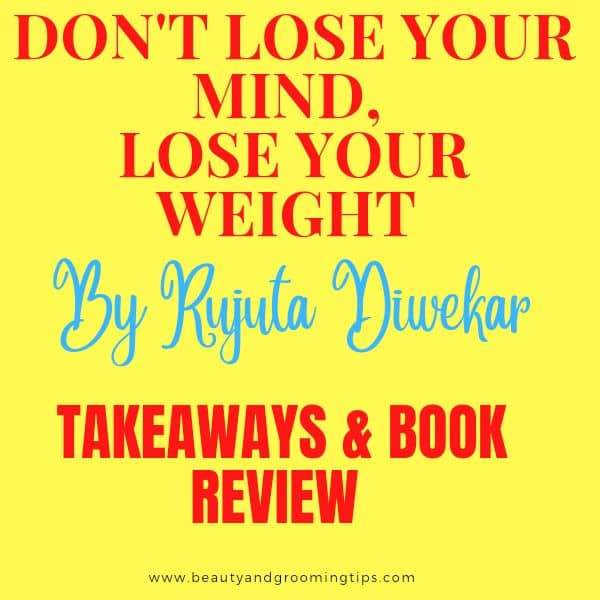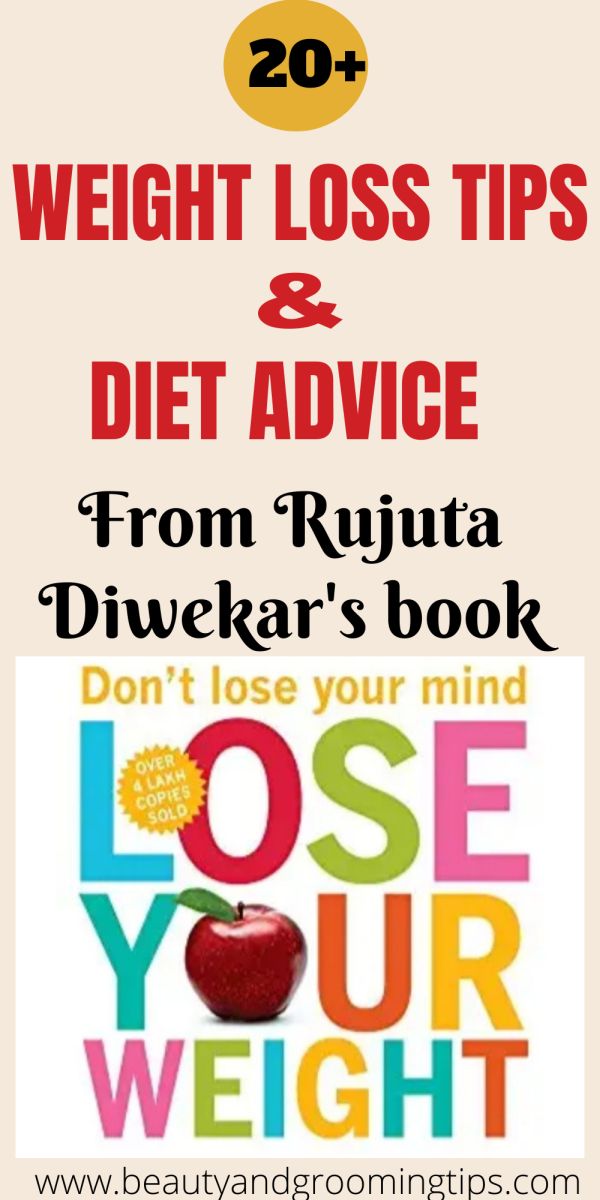How I Discovered Rujuta Diwekar’s Book
Today, I want to share a quick summary and some key takeaways from Rujuta Diwekar’s groundbreaking book, Don’t Lose Your Mind, Lose Your Weight. But before diving into the review, let me tell you how I ended up reading this book in the first place!
I first heard about Rujuta Diwekar years ago when she rose to fame as a celebrity nutritionist, working with Bollywood stars and industrialists.
Her client list was impressive—names like Kareena Kapoor, Anupam Kher, Amrita Arora, Alia Bhatt, and even Mukesh Ambani.
At the time, her book, Don’t Lose Your Mind, Lose Your Weight, was highly recommended by Kareena Kapoor herself. Despite my own struggles with losing a few extra kilos, I never got around to reading it back then.
Rujuta Diwekar’s Social Media Dominance
Fast forward to recent years, and Rujuta Diwekar was everywhere on social media. Her posts, short videos, and reels flooded platforms like Facebook, Instagram, Twitter, and YouTube. With millions of followers, her diet and fitness advice seemed to resonate with a lot of people, judging by the enthusiastic comments on her content.
The Controversy: Is Rujuta Diwekar’s Advice Unscientific?
But not everyone was a fan. In 2018, I stumbled upon an article by Sandhya Ramesh, a science journalist at ThePrint, that critiqued Rujuta’s approach. Sandhya didn’t hold back, calling out Rujuta for what she deemed unscientific advice on food and nutrition.
One example that stood out was Rujuta’s recommendation for diabetics to eat mangoes without emphasizing portion control—a suggestion that didn’t sit well with Sandhya or many healthcare professionals.
Sandhya also pointed out that Rujuta often relied on outdated studies, like the claim that artificial sweeteners cause cancer or that microwaved food loses nutrients and becomes toxic.
These studies have been debunked, yet Rujuta continues to reference them, which Sandhya found frustrating. You can read the full article here.
Adding to the controversy, Rujuta has also faced criticism for promoting sabudana (tapioca pearls) as a "superfood" for conditions like pregnancy, menopause, and fertility.After reading that piece, my opinion of Rujuta took a hit, and reading her book was the last thing on my mind.
Why I Finally Read the Book
But then, during the 2019 lockdown, I found myself in a book-reading phase. On a whim, I decided to give Don’t Lose Your Mind, Lose Your Weight a shot and downloaded it on my Kindle. Little did I know, it would spark a whole new perspective.
Don’t Lose Your Mind, Lose Your Weight – My Thoughts on Rujuta’s Diet & Lifestyle Advice
I must admit, I was pleasantly surprised by how much I actually liked Rujuta Diwekar’s book! Her approach to dieting is refreshingly different. Unlike the typical “starve yourself” or “eliminate entire food groups” advice, Rujuta advocates eating to lose weight. According to her, eating correctly is a lifelong commitment, and your diet should reflect that.
No Torture, No Deprivation – Rujuta’s Balanced Approach
One of the things I appreciated most is her rejection of extreme measures. She emphasizes that you don’t need to torture yourself in the gym, cut out carbs, avoid fats, or jump on fad diets like all-fruit or soup-only plans. Instead, she encourages moderation. You can eat all the foods you love, as long as you do so mindfully and in the right portions.
Stay True to Your Roots
Rujuta’s advice is deeply rooted in Indian culture and traditions. She suggests sticking to foods we’ve grown up eating, as our bodies are already accustomed to them. Her diet tips are tailored to the Indian context, making them relatable and easy to follow for most of us.
Personalized Eating – One Size Doesn’t Fit All
She stresses that your diet should align with your lifestyle, physical activity levels, fitness goals, preferences, and even genetics. There’s no universal diet that works for everyone. Instead, she advocates for a sustainable, long-term approach to eating. After all, a diet you can’t stick to is no diet at all.
Simple, Conversational, and Relatable
What makes the book even more enjoyable is its conversational tone. Rujuta avoids complicated jargon and explains concepts like carbs, proteins, fats, vitamins, and minerals in a way that’s easy for anyone to understand.
She spices up the book with personal anecdotes, glimpses into her life, and stories about the diet advice she’s given to her clients. There’s even a sprinkle of politics and Bollywood gossip, which keeps things light and engaging.
Don’t Lose Your Mind, Lose Your Weight – Summary, Takeaways, Tips & Review
Rujuta Diwekar’s Don’t Lose Your Mind, Lose Your Weight is packed with practical advice and refreshing perspectives on diet and lifestyle. Here’s a summary of the key takeaways and tips from the book, along with my thoughts:
1. All Food is Good – No Need for Deprivation
Rujuta emphasizes that no food is inherently “good” or “bad.” All foods contain essential nutrients like carbs, proteins, fats, vitamins, and minerals. She warns against fad diets that eliminate certain foods or promote only one “superfood.” Such deprivation can create imbalances in the body. Instead, she encourages developing a healthy relationship with food and eating everything in moderation.
Her mantra: There’s no such thing as “safe food” or “fattening food.” If eaten judiciously, at the right time and in the right quantity, everything is good for you.
2. Exercise and Diet Go Hand in Hand
Rujuta stresses that any diet plan without exercise is incomplete. While cutting calories might help you lose weight, it can also lead to muscle and bone density loss. She recommends 30 to 45 minutes of exercise, three days a week, to keep your body in good shape.
As she puts it: Losing weight due to illness (like diarrhea or TB) isn’t the goal. A sustainable diet combined with regular exercise is the way to go.
3. Homemade Fried Snacks Are Better
Craving fried snacks like chaklis or chips? Rujuta suggests making them at home. Not only will you use better-quality ingredients and cooking oil, but the process itself is time-consuming, so you’ll likely indulge less often.
Store-bought “low-fat” or “baked” snacks can be misleading. They create a false sense of security, making you overeat. Her advice? Ditch packaged junk food and opt for homemade treats.
4. One Size Doesn’t Fit All
Your diet should be tailored to your body, lifestyle, and preferences. Rujuta advises against blindly following someone else’s diet plan. Instead, customize your eating habits based on your activity levels, profession, climate, and tastes.
5. Train Your Stomach
Overeating is often a result of not paying attention to your body’s signals. Rujuta suggests eating mindfully and stopping before you reach the overeating threshold. Savor every bite, eat slowly, and listen to your stomach.
6. Always Eat Freshly Prepared Food
Freshly cooked meals are the way to go. Rujuta advises consuming food within three hours of cooking and avoiding deep-freezing cooked meals.
7. Cook for Smaller Groups
The fewer people you cook for, the better the nutrient retention. Cooking in large quantities often means using more oil and heat, which can compromise the quality of the food. Restaurant food can never match the goodness of home-cooked meals.
8. Eat Fruits and Vegetables Whole
Cutting fruits and vegetables into small pieces leads to nutrient loss. Rujuta recommends eating them whole and avoiding pre-cut, packaged produce from supermarkets.
9. Stay Loyal to Your Genes
Stick to foods you’ve been eating since childhood. Your body is accustomed to digesting and assimilating these foods, making them a better choice for your diet.
10. Eat Local and Seasonal
Local and seasonal foods are easier on your digestive system. For example, mangoes in summer provide a season’s worth of antioxidants—just eat them in moderation.
11. Eat with a Calm Mind
A relaxed state of mind helps your body absorb nutrients better and prevents food from converting into fat. Stay calm while eating, and your digestion will thank you.
12. When and How to Eat Fruits
Eat fruits on an empty stomach or after exercise. At other times, the body converts fructose into triglycerides. Always choose whole fruits over juice to retain fiber.
13. Skip Tea/Coffee First Thing in the Morning
Start your day with real food, not caffeinated drinks. Your blood sugar is low after waking up, and tea or coffee provides no nutrition to your starved cells.
14. Eat Every 2 Hours
Frequent, small meals keep your metabolism active and prevent overeating. Eating every two hours ensures your body uses calories efficiently instead of storing them as fat.
15. Match Food Intake to Activity Levels
Eat more when you’re active and less when you’re sedentary. This helps your body burn calories effectively and prevents unnecessary fat storage.
16. Finish Dinner 2 Hours Before Bed
Give your body enough time to digest food before sleeping. Eating early ensures better digestion, sound sleep, and efficient fat burning.
17. Don’t Eliminate Carbs
Carbs are essential for fat burning, bowel health, and metabolism. Choose low-GI, high-fiber options like brown rice, jowar, bajra, and ragi.
18. Why No-Carb, High-Protein Diets Are Bad
A no-carb, high-protein diet can lead to muscle loss and fat storage. Excess protein is converted into fat, and the body loses glycogen and water, harming overall health.
19. The Importance of Fats
Fats are crucial for surviving periods of stress, illness, or starvation. They provide energy and support vital bodily functions.
20. Choose the Right Cookware
Use iron pans, stainless steel, or glass cookware to improve the nutrient content of your food. Avoid aluminum, as it can leach into food and harm your health.
Final Thoughts
This book is filled with plenty of gems and practical hints, not just for cooking but also for consuming food mindfully. While I don’t agree with everything Rujuta says, I found myself nodding along to most of her tips and advice.
That said, Rujuta’s frequent use of Hinglish—mixing English with Hindi and Marathi words—might be a bit irritating for readers unfamiliar with these languages. While she presents her views in a convincing and easy-to-follow manner, the casual, almost crass tone of the book might feel off-putting to some, especially for a topic as important as health and diet.
Another aspect that stood out (not always in a good way) is Rujuta’s apparent fascination with Bollywood celebrities. The number of times she mentions Kareena Kapoor is mind-boggling! For those who aren’t fans of Bollywood or its glitzy world, this star-struck attitude can come across as annoying.
That said, Don’t Lose Your Mind, Lose Your Weight is a valuable read for anyone interested in health and weight management. It’s a book worth revisiting multiple times!This post may contain affiliate links which means I may make a small commission if you purchase something via a link on the site - at no additional cost to you. As an Amazon Associate I earn from qualifying purchases. Please read the complete disclosure policy to know more.
You can buy this book at Amazon.
You can also buy the Hindi version.
Khaiye Aur Vajan Ghataiye - Kindle
Over to you
Have you read Rujuta Diwekar’s Don’t Lose Your Mind, Lose Your Weight? Did her tips help you lose weight or improve your health? What did you like or dislike about the book? Share your thoughts in the comments


Any idea where I can find a free pdf of the book "Don't lose your mind, lose your weight"?
ReplyDeletePlease send me a free pdf or epub of Rujuta Diwekar’s book at sonu45 (at the rate)mail.com
ReplyDeleteI don't have free pdf or free epub version of Rujuta Diwekar's book "Don't lose your mind lose your weight." But you can buy it from /amazon from here or from any other link mentioned at the end of the post. They are not very costly. You can easily afford it.
DeleteYou have summarised the entire book so beautifully. What's the need to read the book? 😀
ReplyDeleteHa, Ha. Thanks
Delete